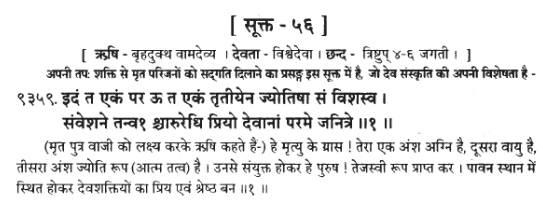This is explained in RV mandala X hymn 56. It is either a horse or a son of Bṛhaduktha named Vajin who died recently.

इदं त एकं पर ऊ त एकं तर्तीयेन जयोतिषा संविशस्व | idaṃ ta ekaṃ para ū
ta ekaṃ tṛtīyena jyotiṣā saṃviśasva
संवेशने तन्वश्चारुरेधि परियो देवानाम्परमे जनित्रे || saṃveśane
tanvaścāruredhi priyo devānāmparame janitre ||
First two verse describes how body would divide into various constituents and unities with Agni, Vayu, and light. Also, consciousness unites with the Sun.
Then in next verse, the journey of the dead into some unknown world is described followed by how dead person unites with his old body and their meeting the with pitrs who have achieved godhood after death.
The hymn:
1 HERE is one light for thee, another yonder: enter the third and he therewith united.Uniting with a body be thou welcome, dear to the Gods
in their sublimest birthplace.
2 Bearing thy body, Vajin, may thy body afford us blessing and thyself
protection.Unswerving, stablish as it were in heaven thine own light
as the mighty God's supporter.
3 Strong Steed art thou: go to the yearning Maidens with vigour,
happily go to heaven and praises: Fly happily to the Gods with easy
passage, according to the first and faithful statutes.
4 Part of their grandeur have the Fathers also gained: the Gods have
seated mental power in them as Gods.They have embraced within
themselves all energies, which, issuing forth, again into their bodies
pass.
5 They strode through all the region with victorious might,
establishing the old immeasurable laws.They compassed in their bodies
all existing things, and streamed forth offipring in many successive
forms.
6 In two ways have the sons established in his place the Asura who
finds the light, by the third act,As fathers, they have set their
heritage on earth, their offspring, as a thread continuously spun out.
7 As in a ship through billows, so through regions of air, with
blessings, through toils and troubles, Hath Bṛhaduktha brought his
seed with glory, and placed it here and in the realms beyond us.
